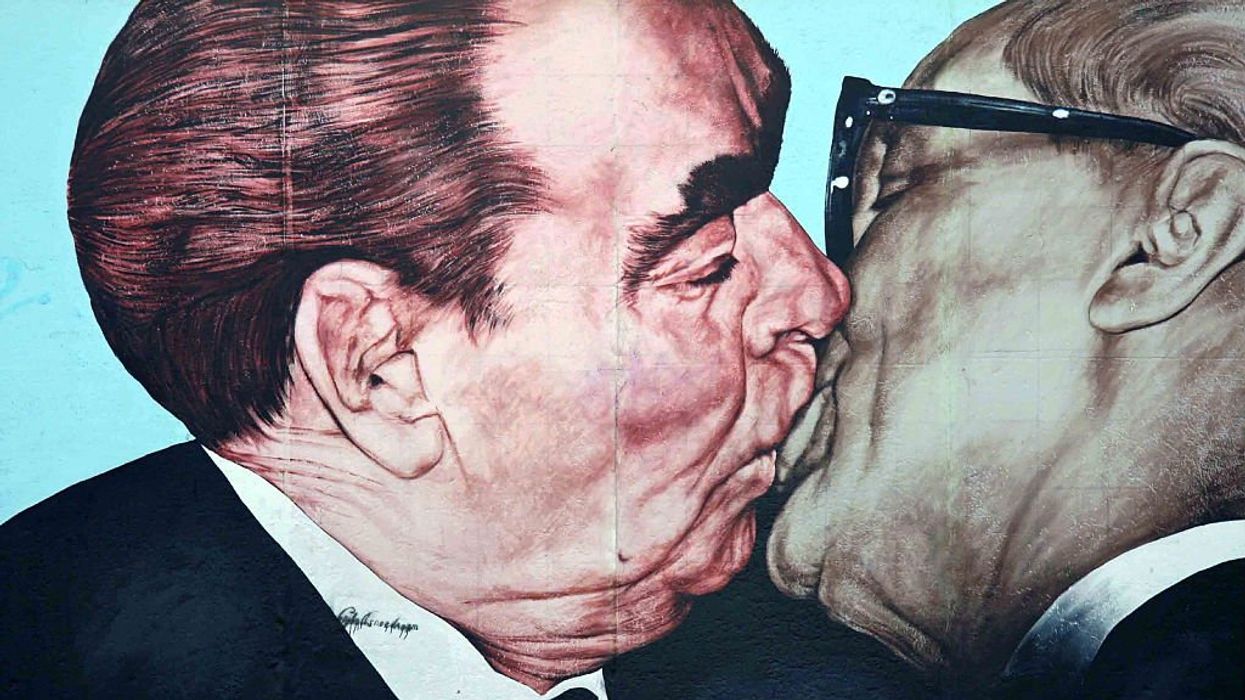
Universal History Archive/Getty Images

Simon Rosenthal made art critical of his homeland's COVID policies. Then, a fellow citizen turned him in.
While Americans on the left worry they have a Hitler in their midst, Germany seems to be taking a cue from a more recent leader: East German socialist strongman Erich Honecker.
Honecker maintained his grip on power through fear, coercion, and a vast network of informants, all under the guise of protecting the state. Now, decades later, this mentality has returned but with more sophisticated digital tools and a post-pandemic veneer of legitimacy.
And yet this new thought-crime regime resembles nothing so much as the informant culture that flourished in East Germany under the Stasi, where citizen was pitted against citizen.
There's no better example of this updated secret police playbook than the case of Simon Rosenthal.
A painter and conceptual artist, Rosenthal studied art history, philosophy, and graphic art in Bamberg, Paris, and Dresden.
But it’s the 40-year-old’s defiance against the creeping authoritarianism in Germany that has really put him on the map. As Rosenthal describes the current state of his homeland:
"For me, Germany has changed massively, especially since the start of the Corona policy. Academic freedom, freedom of expression, freedom of the press, the right to privacy, property, and, more and more often, artistic freedom are being taken away from us by politics."

The German citizen has, for years, watched the country he loves morph into an absolute monster.
So it's apt that Rosenthal addresses this transformation with a collection of biting digital collages he calls the "Mutants" series. German authorities don't seem to be fans.
And no wonder. "German Mutant" criticizes the government’s authoritarian handling of the pandemic, directly referencing German Health Minister Karl Lauterbach's infamous statement that "vaccination creates freedom," a chilling echo of Nazi-era rhetoric.
For this, Rosenthal was hit with a €3,250 fine, accused of "incitement to hatred" by the state-funded "hate speech" reporting portal Meldestelle REspect!
According to Rosenthal, "New denunciation portals are constantly being created, and people are encouraged to anonymously report others for crap. A large part of society even seems to welcome this and calls it ‘Our Democracy.’"
And yet, this new thought-crime regime resembles nothing so much as the informant culture that flourished in East Germany under the Stasi, where citizen was pitted against citizen. The Berlin Wall may have fallen, but the ghosts of authoritarianism seem to be rising again.
Rosenthal heads to court on October 29. If he loses, he could face financial ruin; even now, it's draining his funds.
"The case also puts a strain on me financially," he notes, "as I have to pay for my lawyer and possibly also the court proceedings and a large fine myself. No legal protection insurance covers this — because when the accusation of ‘incitement to hatred’ is made, the insurance companies assume that one acted intentionally. That's completely crazy."
He’s right. It is. On one side, Rosenthal — a lone artist battling for his constitutional rights. On the other, the state, using taxpayer money to crush dissent. If the state wins, the taxpayers gain absolutely nothing. But if it loses, taxpayers foot the bill. This leaves the citizen at a severe disadvantage. This isn’t merely a legal case; it's a reflection of Germany’s democracy in decline.
And Rosenthal's fate could have far-reaching repercussions for all artists in Germany. As he explains, "The state apparently wants to take away a right from me that, after the end of National Socialism, was given an increased status in our constitution precisely to enable artists to counteract undesirable political developments."
If the government succeeds in using Rosenthal’s case to set a precedent, it will not only undermine artistic freedom but also strip citizens of their right to protest and criticize.
As Germany hurtles toward an abyss of authoritarian control, the October 29 trial is shaping up to be far more than a legal proceeding — it could be the death knell for the freedoms that once defined the nation.
If ever there was a moment to pay attention, it’s now.
The case against Rosenthal also reveals how deeply compromised Germany's political and legal systems have become. As Rosenthal himself points out, “One should not forget that the public prosecutor’s office in Germany reports to the Ministry of Justice — i.e., the government parties — and is therefore not politically independent.” This is crucial. What Rosenthal faces isn’t just legal action; it’s a political case, a targeted attack on anyone who dares challenge the state’s increasingly authoritarian overreach.
Rosenthal's art is about more than just criticism — it's an act of resistance against a government that, in his words, "seems to hate our constitution and therefore the freedom of the individual" (sound familiar, American readers?). The very freedoms enshrined in Germany's post-war constitution are under siege by the same state that should be defending them.
He’s correct to call out the absurdity of the government’s behavior. While a few (not many) European countries have moved on from their pandemic overreach, issuing amnesties and offering apologies, the German government clings to its failed policies.
“If it weren’t the case,” Rosenthal argues, “it would finally stop defending the Corona policy and — like in other European countries — issue a general amnesty, apologize to the citizens for everything they did to them, and then resign as a group.” Instead, the government doubles down, using “petty and spiteful actions” to punish critics like Rosenthal, damaging not only the reputation of the government but the state itself.
As Germany continues its descent into a bureaucratic hellscape where artists are fined for challenging the state and prosecutors operate as government pawns, the question is no longer whether the country is heading in the wrong direction. The real question is, how much further will it fall before the people push back?
There are signs that Germans have had enough of this police state 2.0. The conservative Alternative for Germany party has surged to 19.5%, claiming the second spot in national support. Meanwhile, the far-left coalition government is imploding, barely scraping together 28%. The Christian Democrats lead with 32.5%, while the left-wing BSW flounders at 10%.
Brandenburg’s September 22 election could mark the beginning of the political overhaul Germany desperately needs. And not a moment too soon.
John Mac Ghlionn
Contributor